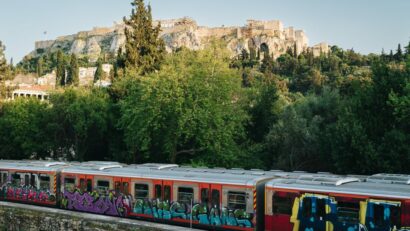
A train collision, a toxic derailment and thousands killed in an earthquake: How cost-cutting led to disaster in Turkey, Greece and Ohio
A train collision in Greece, a toxic derailment in Ohio, and thousands killed under collapsed buildings in Turkey – February 2023 was a month marked by tragedy across the world. What unites those affected by these disasters is a feeling of injustice and a demand for change within the governments and regulatory bodies that they see as responsible. As blame is passed around, the people of these nations see a common theme: cost-cutting, profiteering and a lack of respect for workers rights and civilian safety.
As the dust settles after a month of tragedy across the world, those left grieving the loss of family, friends and fellow citizens, and fearing what the future holds, are questioning who is to blame for their loss. Residents of Turkey and Syria watched as buildings toppled and crumbled around them, people in East Palestine, Ohio, were left fearing the air they breathe, and Greeks awoke to the tragic news of a train collision which took the lives of dozens. These disasters are varied and spread across Europe, Asia, and North America, but they are linked by a common theme. They were – largely, if not entirely – avoidable. In each affected country, people have come out to protest what they see as government and regulatory failings, blaming a thirst for profit and the cost-cutting which goes along with it.
Neglected infrastructure and outdated equipment in Greece
Last month, in the Thessaly region of Greece, a passenger train and a freight train collided, resulting in the deaths of at least 57 people – many of whom were young students. This tragedy whipped up great anger among Greeks and particularly young people who had lost fellow students and felt a sense of solidarity with those who had been the victim of, as they see it, governmental failings.
Protests broke out as the news hit the population, soundtracked by calls of “murderers!” towards the officials and the centre right government who many Greeks hold responsible. Metro and rail workers immediately organised a strike through their unions, showing anger at a problem that had been placed at their door through years of apathy and neglect directed at their sector.
Those who wish to deflect from the government’s responsibility claim that the tragedy was the result of human error, which is reflected in the arrest of the stationmaster responsible for the affected section of railroad on the night of the collision. But as the unions see it, the people involved were never given a fair chance at operating safely. The stationmaster, Vassilis Samaras, according to his lawyer, shares this view. As they see it, they are partly responsible, but were working under difficult conditions – he was the only staff member responsible for the region as his colleagues had already gone home – and with a barely functioning signalling system.
Protesters highlight outdated rail infrastructure in the Mediterranean country (Photo: Nick Night / Unsplash)
Protesters and unions have called the government out on staff shortages, outdated equipment and underfunded infrastructure, with the overarching problem of cost-cutting at every opportunity. One such protester, Stelios Dormarazoglou, explained how he understood the disaster:
“Everyone knows that if the Greek state had wanted, this accident could have been prevented. My own son worked on upgrading the signalling system – nine years ago. Ever since it’s been stalled because companies are only ever interested in profits.”
The Greek president, Katerina Sakellaropoulou, has pledged to do all she can to modernise the Greek railway system and introduce automated safety systems, but for many Greeks this is too little too late.
Overworked railroad workers in Ohio
On February 3, thirty-eight cars of a Norfolk Southern freight train passing through East Palestine – eleven of which were carrying hazardous materials – derailed and ignited into a 48-hour-long blaze. This resulted in toxic and carcinogenic materials being pumped into the air and seeping into the ground and waterways. While people within a one-mile radius were evacuated, this is seen as a feeble response to an environmental disaster which should never have taken place.
The bulk of health concerns from residents of East Palestine and the surrounding area relate to the release of vinyl chloride into the surrounding environment. It is reported that upwards of 40,000 fish and animals have died as a result, including family pets as far as 10 miles away. While no people died directly as a result of the derailment, residents of the town report rashes, headaches and coughs, and live in a state of anxiety surrounding the long-term health and environmental consequences of the pollution.
[embedded content]
Echoing the accusations made by those in Greece, residents of the area and railroad workers argue that this disaster was avoidable and was the result of underfunding, overworking, and a lack of respect for safety regulations. Ron Kaminkow, the general secretary of Railroad Workers United, made clear his feelings of where responsibility lies:
“Without a change in the working conditions, without better scheduling, without more time off, without a better work-life balance, the railroad is going to suffer… it’s just intrinsic, with short staffing. Corners get cut and safety is compromised.”
Between 2018 and 2020, railroad jobs were cut by 40,000. This added great strain to already overworked employees, not helped by the fact that they receive no paid sick leave, forcing workers to either work through illness or lose wages. They can also be disciplined and eventually let go simply for taking time off. This added stress for the workers is even more insulting, as the six main railroad companies in the United States reported $22 billion in profits over 2022.
The toxic cocktail of working through illness, punitive measures for time off, increased workload due to staff cuts, and the resulting low morale, means railroad workers are far from being able to do their job to the required standard. This, evidently, can result in disaster when working with dangerous cargo.
Leo McCann, chair of the rail labor division of transportation trades department, summed up the general feeling, saying:
“The railroads are more interested in profitability and keeping their return on investment up and their numbers down so they can satisfy Wall Street, and they just live behind this shield hoping nothing will happen.”
Buildings crumble and collapse in Turkey
While nothing can be done to prevent the occurrence of an earthquake, the Turkish authorities were not naïve as to the inevitability of such an earthquake taking place. The nation, which straddles the European and Asian continents, is the meeting place of three tectonic plates: the African Plate, the Arabian Plate and the Anatolian Plate. This leaves the area highly vulnerable to severe earthquakes.
85,000 buildings collapsed as a result of the magnitude 7.8 earthquake, claiming almost 50,000 lives and injuring and additional 115,000 in Turkey. As the initial shock settled and rescue efforts began, people started to wonder why some buildings collapsed while others stood and saved those within.
Many nations, such as Japan, who are plagued with the same problem take strict measures to minimize destruction and casualties, mostly through building regulations which require contactors to construct earthquake-proof buildings. This was also the case in Turkey until 2019 when the Erdogan government retroactively legalised thousands of buildings which did not meet earthquake construction standards. In order to avoid adapting these substandard buildings and ignore regulations for new buildings, owners and contractors had only to pay a fine to the Turkish government, putting money before the lives of thousands.
Around 75,000 buildings in the earthquake zone had been affected by this change in law, and when the disaster struck many crumbled under the stress, leaving those within or passing by trapped, injured, or dead. Turkish engineers and architects had warned that this relaxation of the law was putting lives in danger, but they were ignored, and their voices drowned out by those who saw only economic growth.
The lax regulations and resulting tragedy are not just the result of profiteering, they are also due to a hunger for political power. A large part of Erdogan’s electoral success is down to his promise of more jobs and more homes for the Turkish people via a massive construction drive. But many of the country’s residents did not receive the homes that were promised – thanks to an obsession with profit and growth and the resulting neglect of regulations and building standards, they received tombs. Läs mer…

